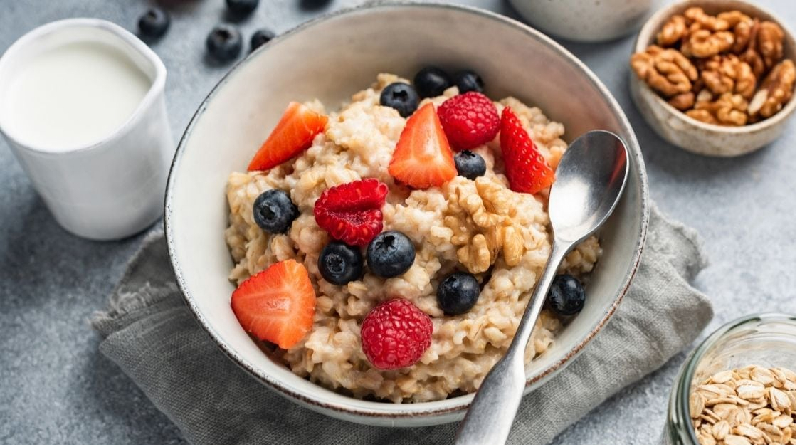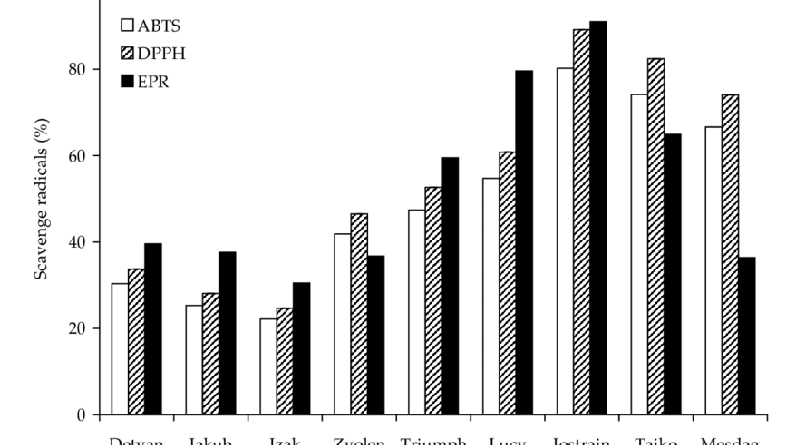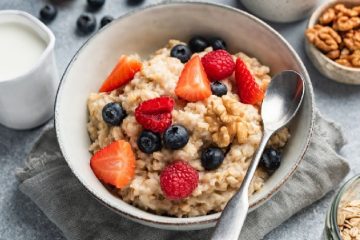The Nutritionist-Explained Benefits of Oatmeal

Some people find comfort in eating oatmeal. What’s more, there are good reasons to incorporate oatmeal into your diet, as evidenced by the numerous studies that have shown its many positive effects. Oatmeal has many uses and is more versatile than you might think; it’s a nourishing staple food that also happens to be delicious. Here are five arguments in favour of making oatmeal a regular part of your diet and some suggestions for tasty and nutritious ways to use it in dishes other than breakfast.
Antioxidants Found in Oatmeal

Oats contain polyphenol antioxidants, which are both anti-inflammatory and antioxidant. Polyphenols have been shown to slow down the ageing process and protect cells from disease by decreasing oxidative stress. (Oxidative stress, in its simplest form, is a result of an imbalance between the production of free radicals that damage cells and the body’s ability to counteract their harmful effects. Polyphenols have been linked to warding off type 2 diabetes, obesity, and cardiovascular disease thanks to their bodyguard-like effects.
Increased Nutrition Thanks to Oatmeal
Oatmeal’s healthy starch content may surprise those who have avoided it because of concerns about weight gain. Oatmeal eaters have been shown to have a better overall diet quality, as measured by the USDA’s Healthy Eating Index.
Nutrition from Whole Grains
Being a whole grain, oatmeal helps with weight control and provides better nutrition in general. Because the bran and germ are removed from refined grains, key nutrients and fibre are lost in the process, but both are still present in whole grains.
Increases Fullness
In addition, a small study found that oatmeal improved satiety, or the degree to which one feels full even after eating. This study compared the effects of eating oatmeal versus another common breakfast food, oranges, on participants’ feelings of hunger and fullness. Those who consumed oatmeal for breakfast were more satisfied and ate fewer snacks in the morning and early afternoon. Beta-Glucan Fiber, Found in Oats, Has Protective Properties
About 14% of the daily value for fibre can be found in just half a cup of oatmeal, but the type of fibre found in oatmeal is particularly beneficial.
Promotes Healthy Immune System Activity

Oatmeal contains the fibre beta-glucan, which has been shown in studies to improve immune function, lower cholesterol, and stabilise blood sugar. These properties may explain why eating oatmeal on a regular basis has been linked to a reduced risk of cardiovascular disease and type 2 diabetes.
Antioxidant effect
Furthermore, the article describes how beta-glucan contributes to the body by functioning as an antioxidant. In this function, it is associated with protecting against atherosclerosis and neurodegenerative disorders like Alzheimer’s disease. In addition to its prebiotic properties, beta-glucan aids in gastrointestinal health by reducing inflammation and promoting normal bowel function. Prebiotics are foods that promote the growth of beneficial microbes in the gut while suppressing the growth of pathogenic bacteria.
Curbs Sugar Levels in the Blood
In 2020, researchers investigated the effects of oatmeal on blood sugar as a possible short-term intervention for patients with type 2 diabetes.
9 Blood sugar levels were significantly lowered, and insulin sensitivity was enhanced, in those who regularly consumed oatmeal. Researchers found that beta-glucan contributed to the beneficial effects of oatmeal and came to the conclusion that it could be used to help prevent and manage diabetes.
Leave a reply
You must be logged in to post a comment.











